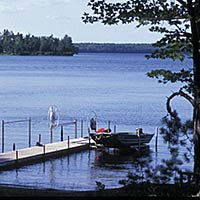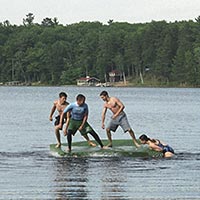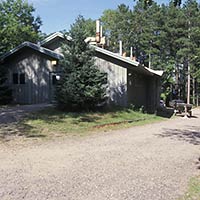Dances with Dragonflies: Agile Insect a Signal of Shoreline Health
Plumbing the Depths of Lake Ecology

On the bank of Trout Lake.
Tucked amidst a sprawling patchwork of almost 7,000 lakes, Trout Lake Station — a bustling north Wisconsin hub of ecological exploration — is almost deserted on a hot summer afternoon.
Under a piercing blue sky, bejeweled dragonflies languidly float in a gentle breeze wafting in from the surrounding North Woods.
Behind station headquarters, the calm, expansive waters of Trout Lake serve as a reminder of the scientists who have flocked here for more than 80 years, striving to understand the unique mysteries of lake biology.
As twilight falls, the station’s summer residents filter into sight. Most are University of Wisconsin-Madison postdoctoral, graduate and undergraduate biologists returning from a typical day in the field. They’ve spent all day in the sun, immersed in the stuff of biology — diving for water samples, tracking fish, counting bugs and chasing after frogs.

UW-Madison students enjoy a splash after a long day in the field.
Just hours ago, Trout Lake lay as still as a farm field, but now it splashes with squealing students who make a beeline to the dock. “Living here is kind of like summer camp!” says undergraduate biologist Katie Dosch, before jumping in.
A festive spirit does permeate this remote research setting where students—the biggest group of residents here — board together in quaint remodeled cabins that once served as laboratories and still bear names like “Bacteriology.”
But a lot has changed since those early days, when renowned lake scientists Chauncy Juday and Edward Birge founded this research station 81 years ago. Lake scientists were more intent on basic investigations back then, such as the unraveling of energy patterns and simple descriptions of lake nutrient cycles.

Limnology research facility office at Trout Lake Station.
But several decades on, even the beautiful North Woods are a whole new world, with modern-day environmental threats such as deforestation and housing development looming larger every day. In response, many present-day researchers and students at Trout Lake — part of UW-Madison's College of Letters and Science — are increasingly using science to help inform environmental policy in the area.
“The rich biological diversity and beautiful lakes are the reason people want to develop here in the first place,” says Jake Vander Zanden, a UW-Madison professor of limnology. “But that’s what we call ‘loving the lakes to death.’”